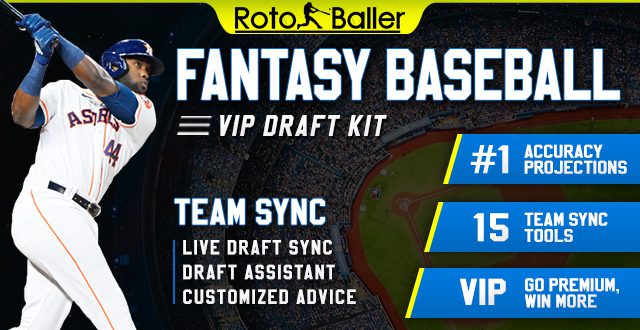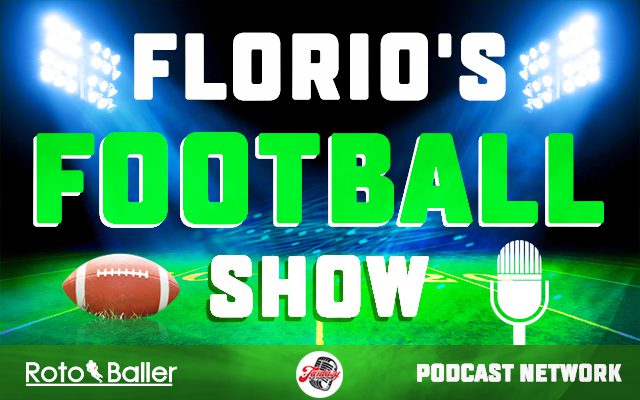It's safe to say we have had an interesting start to the 2018 MLB season. It's hard not to overreact to early slumps, hot streaks, and injuries, but we'll try to help you decide which players are worth owning and which are not.
All year long, we at Rotoballer will be digging deep and looking for the players you need to keep on your radar and grab if you can. Just check our famous waiver wire blog each and every week.
The only qualifiers for this list are that said player is A) an outfielder, and B) owned in fewer than 50% of all Yahoo leagues. That means popular adds like Jose Martinez won’t be getting written up because, at this point, most leagues know about him and have added him. Rather, we’re looking for players that are truly overlooked, but still have value.
Be sure to check all of our fantasy baseball lineup tools and resources:- Fantasy baseball trade analyzer
- BvP matchups data (Batter vs. Pitcher)
- PvB matchups data (Pitcher vs. Batter)
- Who should I start? Fantasy baseball comparisons
- Daily MLB starting lineups
- Fantasy baseball closer depth charts
- Fantasy Baseball live scoreboard
- Fantasy baseball injury reports
Week 2 Outfield Waiver Wire Targets
Brandon Belt – San Francisco Giants (46% owned)
I call him! I got here first! I don’t care if he plays first base, he plays enough in the outfield to qualify for this column, so I claim him!
Now that the “shotgunning” is out of the way in regards to my colleague who writes the corner infielders waiver wire column, I can address this serious injustice. Brandon Belt is a wildly underrated player, and the fact that he is owned in just 46% of leagues is appalling. He is a talented hitter that is only on the fringes of fantasy rosters due to less than impressive power for a first baseman. Last season, despite a low BABIP and lower average, Belt hit for a career best .228 ISO while bringing a solid K/BB ratio and elite level OBP.
The metrics suggest good things are coming for Belt. His strong ISO from last season has continued thus far, and his hard hit percentage on contact is at a sky high 46.7%. He’s making strong, better contact, has an approach that promotes a high average and elite OBP. And best of all, it’s probably going to get better, as he’s only made contact on 66% swings, more than 10% lower than his career average. Belt is too good a hitter to continue that trend, and the growth in power could make him a top 10 first baseman in OBP leagues, and a solid OF3/4 in shallow mixed leagues.
Corey Dickerson – Pittsburgh Pirates (33% owned)
Tampa made the surprise move to cut a player who, a season ago, was their best hitter. A .282/.325/.490 is a strong line, but there were enough warts there to warrant Tampa dumping his salary for little (read Fangraphs’ piece on the Rays’ bad fastball hitters, for example). In reality, he’s a slightly above average hitter that could be actually be more effective on a per at-bat basis if he were deployed part time.
Pittsburgh likely wasn’t expecting to add a player like Dickerson in the offseason, but he’s there now and the Pirates will enjoy a luxury of having more outfielders than they need. Because of the depth, Dickerson likely won’t get 600 at-bats over the season. But that’s ok, and if you’re adding Dickerson at this point, you’re just hoping to use him against good pitching matchups or as an injury replacement. He has a slightly better line against righties, so consider using him as a UTIL or OF5 when the situation favors it. Just like for Pittsburgh, he’s a luxury for the fantasy team with an open roster spot, but he’s still a good enough hitter to be owned in all formats. A .275/.320/.480 with 23 HR is a reasonable expectation for the season.
Max Kepler – Minnesota Twins (28% owned)
Minnesota outfielder Max Kepler has (very) quietly had a nice start to the season, and the metrics suggest a big breakout could be coming. Granted, he’s only registered 27 at-bats up until this point, but the eye test shows that he’s controlling the strike zone much better than at any point last season. Right now, Kepler’s walked five times versus one strikeout. He’s hitting for more power, and has been a little unlucky on his way to a .273/.407/.500 so far. That’s not just good or above average, it’s elite and good for a 161 wRC+.
Kepler was a popular breakout target in 2017, but was a disappointment with a line of .243/.312/.425 and 19 homers. His biggest problem was, basically, anything involving left-handed pitching. Against righties, he was a slightly above average hitter with .272/.343/.484 and just a 17.2% K rate. Of those 19 dingers, 17 were from against right-handers, and his ISO of .212 vs. 0.88 against lefties is as clear a picture as it gets.
Kepler has held his own against lefties in 2018 better than at any point in his career. But fantasy owners don’t need him to be a lefty masher, just show a little more competence and get to his power against southpaws a little more often. If he can be close to league average and maintain his ratios against righties, he’s an easy top 30 OF. In the event that the 25-year old has not actually made improvements against lefties and this is just a hot streak, Kepler is still a very effective platoon option for fantasy owners.
Jose Pirela – San Diego (7% owned)
San Diego’s 28-year-old utilityman Jose Pirela was a complete unknown going into the second half of 2018. An unnoticed call-up and 344 at-bats later, and Pirela had established himself as maybe one of the Padres’ better hitters. In fact, San Diego manager Andy Green said that it was “going to be hard to play anybody in front” of him going into the season. That’s surprising confidence for a former Yankees farmhand with 144 uninspiring at-bats in his career. So far, Green has kept his word, and Pirela has logged 41 at-bats in 2018 between left field and right field.
While Pirela’s surprising power and solid K/BB ratio from 2017 have yet to make an appearance in 2018, there’s reason for optimism. Pirela is hitting the ball harder than ever before, he’s spraying to the opposite field on 50% of his contact, and he’s making more contact than ever before. He has a high BABIP approach and has walked on just 2.4% of plate appearances. For a high BABIP hitter, good plate control is critical to getting good pitches to drive. Pirela has been pressing so far, but as the season goes on will probably calm down and become more comfortable and disciplined at the plate.
The biggest cause for concern is a spike in ground ball rate, and more than 63% of Pirela’s balls in play are killing worms. On the opposite side, just 10% of contact has been line drives while his 2017 rate was 21.2%. Based on his approach, swing, and performance in spring training, this is likely more of a mirage versus a trend, but owners will be able to make a better determination with a little more data. Right now, Pirela is performing well against most pitch types, but poorly against sliders and changeups despite hitting solidly against those same pitches in 2017. Again, this is more likely a mirage, and nothing in his profile suggests that he’s a different hitter than when he broke out a season ago.
If the gains in contact and hard-hit percentage hold while the approach improves, Pirela could actually improve on his numbers from a season ago. There’s real 20/10 upside here, although that’s certainly on the optimistic side. If Pirela gets enough playing time at second base, he’ll be a solid utility player and injury fill-in for fantasy owners. He should certainly be owned in deeper leagues, and should be on watch list for 12-team leagues.
 RADIO
RADIO

























